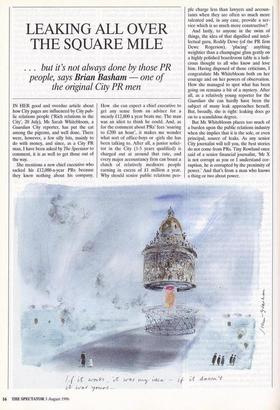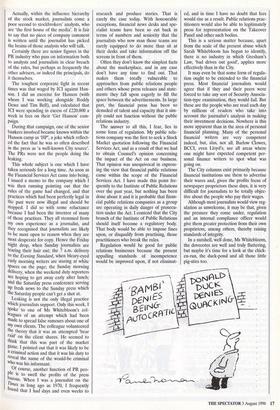LEAKING ALL OVER THE SQUARE MILE
. . . but it's not always done by those PR people, says Brian Basham — one of the original City PR men IN HER good and overdue article about how City pages are influenced by City pub- lic relations people ('Rich relations in the City', 20 July), Ms Sarah Whitebloom, a Guardian City reporter, has put the cat among the pigeons, and well done. There were, however, a few silly bits, mainly to do with money, and since, as a City PR man, I have been asked by The Spectator to comment, it is as well to get those out of the way.
She mentions a new chief executive who sacked his £12,000-a-year PRs because they knew nothing about his company. How she can expect a chief executive to get any sense from an adviser for a measly £12,000 a year beats me. The man was an idiot to think he could. And, as for the comment about PRs' fees 'soaring to £200 an hour', it makes me wonder what sort of office-boys or -girls she has been talking to. After all, a junior solici- tor in the City (1-5 years qualified) is charged out at around that rate, and every major accountancy firm can boast a clutch of relatively mediocre people earning in excess of £1 million a year. Why should senior public relations peo- ple charge less than lawyers and accoun- tants when they are often so much more talented and, in any case, provide a ser- vice which is so much more constructive?
And lastly, to anyone in the swim of things, the idea of that dignified and intel- lectual guru, Roddy Dewe (of the PR firm Dewe Rogerson), 'placing' anything weightier than a champagne glass gently on a highly polished boardroom table is a ludi- crous thought to all who know and love him. Having disposed of those criticisms, I congratulate Ms Whitebloom both on her courage and on her powers of observation. How she managed to spot what has been going on remains a bit of a mystery. After all, as a relatively young reporter for the Guardian she can hardly have been the subject of many leak approaches herself. But, broadly, she is right: leaking does go on to a scandalous degree.
But Ms Whitebloom places too much of a burden upon the public relations industry when she implies that it is the sole, or even principal, source of leaks. As any senior City journalist will tell you, the best stories do not come from PRs. Tiny Rowland once said of a senior financial journalist, 'Mr X is not corrupt as you or I understand cor- ruption, he is corrupted by the proximity of power.' And that's from a man who knows a thing or two about power. Actually, within the influence hierarchy of the stock market, journalists come a poor second to stockbrokers' analysts, who are the first house of the media'. It is fair to say that no piece of company comment is written until the journalist has picked the brains of those analysts who will talk.
Certainly there are senior figures in the PR industry who pass on information both to analysts and journalists in clear breach of the rules, but perhaps as frequently the other advisers, or indeed the principals, do it themselves.
The toughest corporate fight in recent times was that waged by ICI against Han- son. I did an exercise for Hanson (with whom I was working alongside Roddy Dewe and Tim Bell), and calculated that ICI were spending in excess of £220,000 a week in fees on their 'Get Hanson' cam- paign.
During that campaign, one of the senior bankers involved became known within the Hanson camp as 'HP', a joke which reflect- ed the fact that he was so often described in the press as 'a well-known City source'. The PRs were not the people doing the leaking.
This whole subject is one which I have taken seriously for a long time. As soon as the Financial Services Act came into being, I issued a memo to the company which I was then running pointing out that the rules of the game had changed, and that Practices which had been perfectly legal in the past were now illegal and should be stopped. I did so with some reluctance because I had been the inventor of many of those practices. They all stemmed from my own experience as a journalist, and they recognised that journalists are likely to be most open to reason when they are most desperate for copy. Hence the Friday night drop, when Sunday journalists are tearing their hair out; the 7 a.m. delivery to the Evening Standard, when bleary-eyed early morning writers are staring at white spaces on the page; the Sunday morning delivery, when the weekend duty reporters are hoping to get away early after lunch; and the Saturday press conference serving up fresh news to the Sunday press which the Saturday people can't get a shot at. Leaking is not the only illegal practice Which journalists support. Only this week, I spoke to one of Ms Whitebloom's col- leagues of an attempt which had been made to spread false rumours about one of mY own clients. The colleague volunteered the theory that it was an attempted 'bear rale on the client shares. He seemed to think that this was part of the market game. I pointed out that it was likely to be a criminal action and that it was his duty to reveal the name of the would-be criminal who was his informant.
Of course, another function of PR peo- ple is to swell the profits of the press barons. When I was a journalist on the -ones as long ago as 1970, I frequently found that I had days and even weeks to
research and produce stories. That is rarely the case today. With honourable exceptions, financial news desks and spe- cialist teams have been so cut back in terms of numbers and seniority that the journalists who now man those teams are rarely equipped to do more than sit at their desks and take information off the screens in front of them.
Often they don't know the simplest facts about the marketplace, and in any case don't have any time to find out. That makes them totally vulnerable to approaches from public relations people and others whose press releases and state- ments they fall upon eagerly to fill the space between the advertisements. In large part, the financial press has been so denuded of talent and capacity that it sim- ply could not function without the public relations industry.
The answer to all this, I fear, lies in some form of regulation. My public rela- tions company was the first to seek a Stock Market quotation following the Financial Services Act, and as a result of that we had to obtain Counsel's opinion concerning the impact of the Act on our business. That opinion was unequivocal in express- ing the view that fmancial public relations came within the scope of the Financial Services Act. I have made this point fre- quently to the Institute of Public Relations over the past year, but nothing has been done about it and it is probable that finan- cial public relations companies as a group are operating in daily danger of prosecu- tion under the Act. I contend that the City branch of the Institute of Public Relations should itself become a regulatory body. That body would be able to impose fines upon, or disqualify from practising, those practitioners who break the rules.
Regulation would be good for public relations businesses because the present appalling standards of incompetence would be improved upon, if not eliminat-
ed, and in time I have no doubt that fees would rise as a result. Public relations prac- titioners would also be able to legitimately press for representation on the Takeover Panel and other such bodies.
This is a serious matter because, apart from the scale of the present abuse which Sarah Whitebloom has begun to identify, there is no industry in which Gresham's Law, 'bad drives out good', applies more effectively than in the City.
It may even be that some form of regula- tion ought to be extended to the financial press. Most financial journalists would agree that if they and their peers were forced to take any sort of Security Associa- tion-type examination, they would fail. But these are the people who are read each day by millions of readers who take into account the journalist's analysis in making their investment decisions. Nowhere is this more apparent than in the area of personal financial planning. Many of the personal financial writers are very competent indeed, but, alas, not all. Barlow Clowes, BCCI, even Lloyd's, are all areas where one might have expected competent per- sonal fmance writers to spot what was going on.
The City columns exist primarily because financial institutions use them to advertise their wares and, given the profits focus of newspaper proprietors these days, it is very difficult for journalists to be totally objec- tive about the people who pay their wages.
Although most journalists would view reg- ulation as unwelcome, it may be that, given the pressure they come under, regulation and an internal compliance officer would give them greater protection from their own proprietors, among others, thereby raising standards of integrity.
In a nutshell, well done, Ms Whitebloom, the dovecotes are well and truly fluttering, but maybe it's time for a look at the chick- en-run, the duck-pond and all those little pig-sties too.



















































 Previous page
Previous page